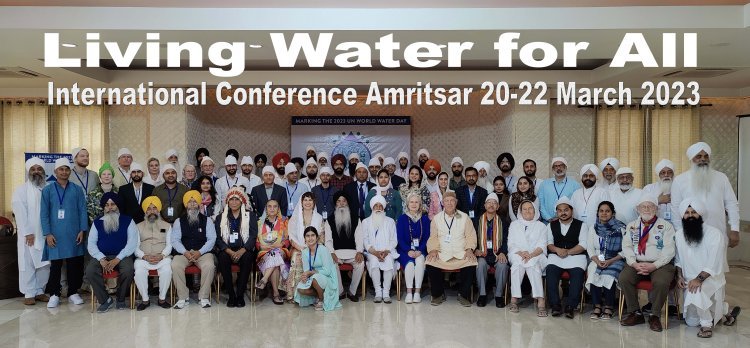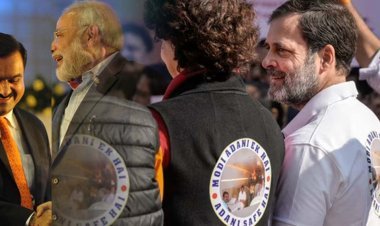Accelerating Change on United Nations World Water Day 2023 — An Interfaith Perspective
Approximately 2 billion people around the world do not have safely managed drinking water services, 3.6 billion people do not have safely managed sanitation services, and 2.3 billion lack basic handwashing facilities.

Dr. A. K. Merchant*
Introduction
“One of the most pressing problems of humanity in the current century is how a growing, rapidly developing, and not yet united global population can, in a just manner, live in harmony with the planet and its finite resources. Certain biological realities present themselves when an organism negatively affects or exceeds the capacity of its ecosystem. The limited availability and inequitable distribution of resources profoundly impact social relations within and between nations in many ways, even to the point of precipitating upheaval and war. And particular arrangements of human affairs can have devastating consequences for the environment,” The Universal House of Justice
The theme for World Water Day 2023 is Accelerating Change. How shall we respond to the call of the United Nations and all those who are committed to make a tangible contribution? Given the great uncertainty and swiftly changing world conditions there is a sense of urgency to positively accelerate changes to solve the water and sanitation crisis because water affects us all, we need everyone to take action. It means you and me! Individually and severally all three protagonists of the society—individuals, institutions, communities—must unitedly make a difference by changing the way we use, consume and manage water in our lives.
World Water Day Themes
My intention in sharing the list of the themes of world water day is to sincerely acknowledge the great efforts made in the past although the success has been limited:
WWD theme 2023 Accelerating Change
WWD theme 2022 Groundwater: Making the Invisible Visible
WWD theme 2021 Valuing Water
WWD theme 2020 Water and Climate Change
WWD theme 2019 Leaving No One Behind
world water day theme 2018 Nature for Water
WWD theme 2017 Why Waste Water?
WWD theme 2016 Better Water, Better Jobs
world water day theme 2015 Water and Sustainable Development
WWD theme 2014 Water and Energy
WWD theme 2013 International Year of Cooperation
world water day theme 2012 Water and Food Security
WWD theme 2011 Water for Cities
WWD theme 2010 Clean Water for a Healthy World
world water day theme 2009 Trans Waters
WWD theme 2008 Sanitation
WWD theme 2007 Coping with Water Scarcity
world water day theme 2006 Water and Culture
WWD theme 2005 Water for Life Decade
WWD theme 2004 Water and Disaster
world water day theme 2003 Water for Future
WWD theme 2002 Water for Development
WWD theme 2001 Water for Health
world water day theme 2000 Water for the 21st century
WWD theme 1999 Everyone Lives Downstream
WWD theme 1998 Groundwater the Invisible Resource
world water day theme 1997 The World’s Water: Is there enough?
WWD theme 1996 Water for Thirsty Cities
WWD theme 1995 Women and Water
world water day theme 1994 Caring for Our Water Resources is Everybody’s Business
According to the Bahá’í writings: “We cannot segregate the human heart from the environment outside us and say that once one of these is reformed everything will be improved. Human beings are organic with the world. An individual’s inner life moulds the environment and is itself also deeply affected by it. The one acts upon the other and every abiding change in the life of a human being is the result of these mutual reactions. From water and earth we came, and the future of humanity on the planet will be determined by respectful or disrespectful treatment of these basic elements.”
A well-known forester and ecologist, Richard St. Barbe Baker (1899-1982), wrote many decades ago when the world was least concerned about the destruction of the environment and the far-reaching consequences it would have in the years ahead: “Water must be a basic consideration in everything: forestry, agriculture and industry. The forest is the mother of the rivers. First we must restore the tree cover to fix the soil, prevent too-quick-run-off, and steady springs, streams and rivers. We must restore the natural motion of our rivers and, in so doing, we shall restore their vitalizing functions. A river flowing naturally, with its bends broads and borrow, has the motion of the blood in our arteries, with its inward rotation, tension and relaxation. Picture a river which has risen from a mountain spring in a well-treed water shed: trees of mixed species and different shaped roots fixing the soil at different levels and reducing competition for food and water. The leaf-fall and humus on the floor of the forest will act as a sponge to retard quick run-off after a storm. Water will sink through to porous soil and form myriads of springs which will feed the land and rivers during the drier months of the year. Mountains and high-ground should be covered with protective forests up to the snow-line, in high country, fields should be kept small and carved out of the forest and always be tree-surrounded…”
I have been involved in issues relating to conservation and supply of fresh water from the time when the United Nations Millennium Development Goals [MDG] (2000-2015) launched in the very year when the then Secretary General Mr. Kofi Anan, had convened the World Summit of Religious and Spiritual Leaders in New York. Today we are struggling to fulfil the Goal Number 6 of Agenda 2030—Sustainable Development Goals. Water issues have also figured in various Parliaments of the World Religions starting with 2004 Barcelona Parliament of World’s Religions. As an ardent supporter of “Living Water for All” project I was invited to an the international conference in Amritsar to addresses number of challenges resulting from climate change, global warming, overpopulation and other anthropogenic activities within the backdrop of other global issues that today have plunged humanity into grave peril, threatening its very survival.
Let me quote from the Scriptures:
Hinduism: “Apo hi stha mayobhuvas” (Water is the greatest sustainer and hence like a mother) –Taittiriya Samhita
Buddhist: “As a lotus flower is born in water, grows in water and rises out of water to stand above it unsoiled, so I, born in the world, raised in the world having overcome the world, live unsoiled by the world.” (Gautama Buddha)
Jainism: “…Every drop of water counts in-terms of importance of water and in-terms of Non-violence too.” (Jain Darshan)
Judaism: “With joy you will draw water from the wells of salvation.” (Isaiah 13:3)
Christianity: “…but whoever drinks of the water that I will give him shall never thirst; but the water that I will give him will become in him a well of water springing up to eternal life.” Gospel of John 4:14
Islam: “Water is the source of all life.” The Qur’an 35:9
Sikhism: “Pahila paanee jeeo hai jit(u) haria sabh(u) koi…” (Sri Guru Granth Sahib, p. 472 [Water is the first source of life. The entire life originated from it.)
Bahá’í Faith: “Ye are all created out of water, and unto dust shall ye return.” The Kitáb-i-Aqdas, paragraph 148
We express our whole-hearted support for the Water Action Agenda, recently launched at the United Nations 2023 Water Conference, in New York from 22nd to 24th March 2023.–the first event of its kind for nearly 50 years. This is a once-in-a-generation moment for the world to unite around water. The Conference aims to identify issues and what needs to change, how the world should create a collective action plan to help all member-states reach the water-related goals faster than ever. The UN believes that now is the time for each person to take responsibility for their actions. Therefore, let us play our part as best as we can.
Suggestions for possible action
Water is crucial for advancing human rights, reducing poverty and inequality, and enabling peace, justice and sustainability. SDG 6 on clean water and sanitation therefore provides a unique opportunity to accelerate progress on the 2030 Agenda. Mainstreaming water in the national and subnational planning of other sectors is critical for increasing policy coherence and effectiveness, for optimizing the use of limited resources available to implement the 2030 Agenda, and for integrating strategies to end poverty. 6.3 by 2030, improve water quality by reducing pollution, eliminating dumping and minimizing release of hazardous chemicals and materials, halving the proportion of untreated waste water, and increasing recycling and safe reuse by x% globally.
A healthy human being can live for a month without food, but will die in less than a week without fresh water. Ninety-seven percent of all water on earth is in the form of salt water. Only 3 percent is fresh, and two-thirds of that is ice. The same amount today as it was when dinosaurs roamed the planet. The problem is not simply the availability and supply of water; the problem is people—our increasing numbers and our flagrant abuse of one of our most precious, and limited, resources. Add to this the problems caused by wastage and pollution of water. It is not just industrial and municipal institutions that are responsible; these can be monitored and controlled by specific laws, the burden of wastage and pollution of water belongs to us all. Water’s nature itself is a part of these complications. The simple structure of hydrogen and oxygen has been called the universal solvent. It takes into solution a vast number of substances, and what it can’t dissolve, it simply pushes along or grinds up fine enough to carry in suspension. Human beings have put this characteristic of water to work in thousands of ways. We wash with it; we flush with it; we mix it with chemicals to spray on our farms and fields; we play with it and in it. It’s in the processes that make paint, plastic, meat, and umpteen other things.
Unfortunately, although we had registered some success in fulfilling the MDG target the situation today is becoming more desperate and alarming. According to a report endorsed by14,000 scientists from 1,990 jurisdictions in 34 countries: “We are nearing or have already crossed tipping points associated with critical parts of the Earth system, including the West Antarctic and Greenland ice sheets, warm-water coral reefs, and the Amazon rainforest."

According to World Bank Report, October 2022: “Approximately 2 billion people around the world do not have safely managed drinking water services, 3.6 billion people do not have safely managed sanitation services, and 2.3 billion lack basic handwashing facilities. Gaps in access to water supply and sanitation, growing populations, more water-intensive patterns of growth, increasing rainfall variability, and pollution are combining in many places to make water one of the greatest risks to economic progress, poverty eradication and sustainable development. The consequences of such stress are local, national, transboundary, regional, and global in today’s interconnected and rapidly changing world. Consequences will be disproportionately felt by the poorest and most vulnerable.”
As we know well, problems of supply are matched by problems of quality. In most agricultural and all urban areas there is serious deterioration of rivers, aquifers and alarming ground water depletion everywhere but especially in India. The world population has crossed 8 billion and with the demand for freshwater doubling every 18 years, at this rate, we are, indeed, moving towards ecological suicide.
Government of India’s National Water Mission
Government of India held its 1st All India Annual State Ministers Conference on Water in Bhopal in January 2023 themed: WaterVision@2047. The Government’s National Water Mission was launched in the context of National Action Plan on Climate Change, to ensure integrated water resource management. It covers a range of issues such as conservation of water, minimizing wastage and ensuring more equitable distribution both across and within states. The Mission takes into account the provisions of the National Water Policy and developed a framework to optimize water use by increasing water use efficiency by 20% through regulatory mechanisms with differential entitlements and pricing. It seeks to ensure that a considerable share of the water needs of urban areas are met through recycling of waste water, and ensuring that the water requirements of coastal cities with inadequate alternative sources of water are met through adoption of new and appropriate technologies such as low temperature desalination technologies that allow for the use of ocean water. The National Water Policy revisits the consultation with States to ensure basin level management strategies to deal with variability in rainfall and river flows due to climate change.
This includes enhanced storage both above and below ground, rainwater harvesting, coupled with equitable and efficient management structures. The Mission seeks to develop new regulatory structures, combined with appropriate entitlements and pricing. It seeks to optimize the efficiency of existing irrigation systems, including rehabilitation of systems that have been run down and also expand irrigation, where feasible, with a special effort to increase storage capacity. Incentive structures have been designed to promote water-neutral or water- positive technologies, recharging of underground water sources and adoption of large scale irrigation programmes which rely on sprinklers, drip irrigation and ridge and furrow irrigation.
Appropriate indicators have been evolved for assessing adaptation benefits of the actions. Together, with enhancements in current and ongoing programmes included in the Technical Document, for guiding the country to adapt to climate change and disaster mitigation. The ‘Technical Document’ annexed with the NAPCC has identified key areas related to: (a) studies on management of surface water resources, (b) management and regulation of ground water resources, (c) upgrading storage structures for fresh and drainage system for wastewater, (d) conservation of wetland, and (e) development of desalination technologies, (f) Jal Shakti Abhiyan: Catch the Rain (i.e. rain water harvesting).
Conclusion
Humanity’s crying needs will not be met by a struggle among competing ambitions or by protest against one or another of the countless wrongs afflicting a desperate age. It calls, rather, for a fundamental change of consciousness. The time has come when each human being on earth must learn to accept responsibility for the welfare of the entire human family. The Bahá’i Writings assert that “the world is being made new. Death pangs are yielding to birth pangs. The pain shall pass when members of the human race act upon the common recognition of their essential oneness. There is light at the end of this tunnel of change beckoning humanity to the goal destined for it according to the testimonies recorded in all the Holy Books.” The internalization of the basic human values could serve as foundational blocks to the profound changes we are all experiencing. “The betterment of the world can be accomplished through pure and goodly deeds through commendable and seemly conduct”. “Be anxiously concerned with the needs of the age ye live in and centre your deliberations on its exigencies and requirements,” Baha’u’llah says.
*The author is General Secretary, Temple of Understanding India Foundation; Joint Secretary, Shanti Sahyog-Centre for Nonviolence, Secretary-General, Global Warming Reduction Centre; National Trustee, Sarvodaya International Trust; Member, Bahá’i Community of India, Member, Faith for Earth Councillors of the UNEP; President, Mintra Foundation; Visiting faculty, Centre for Cultural Resources & Training, New Delhi.

















